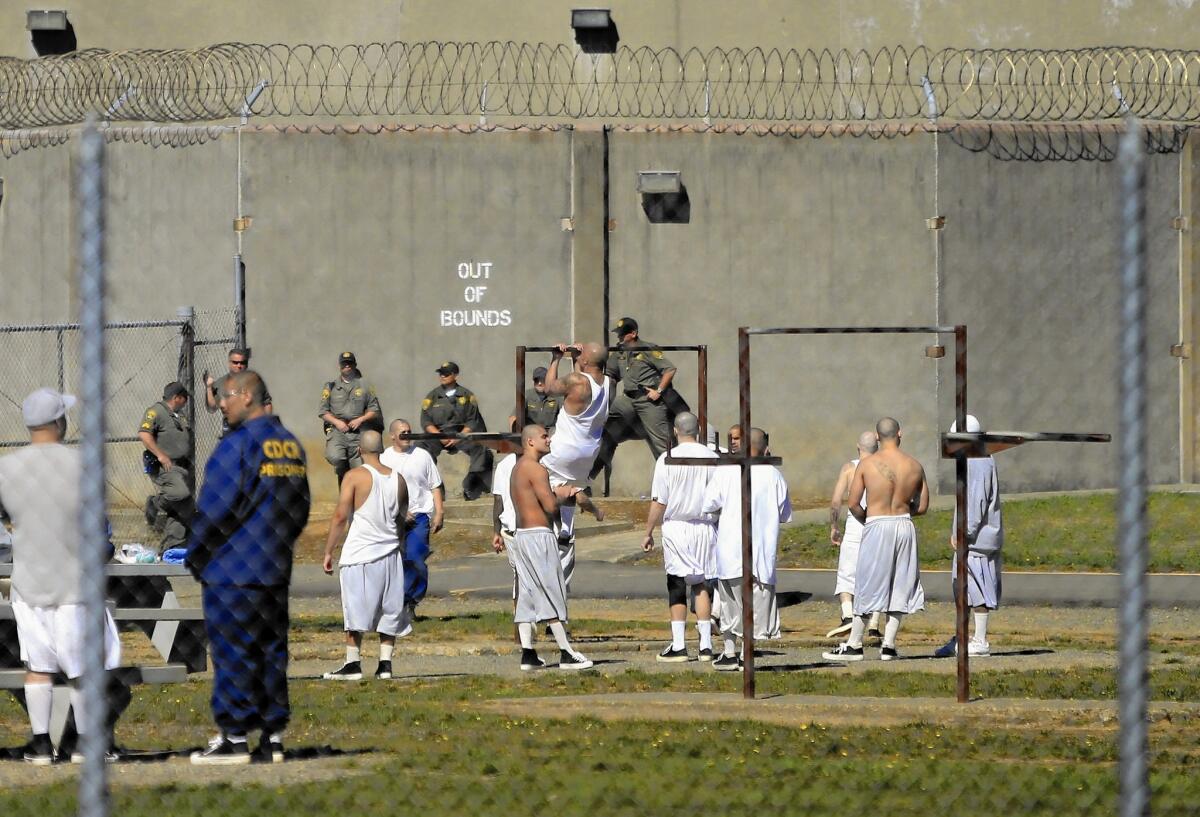Brown’s parole plan would likely reduce prosecutors’ plea-bargain leverage, experts say

- Share via
reporting from SAN FRANCISCO — Gov. Jerry Brown’s plan to give more inmates a chance for early release would probably reduce prosecutors’ leverage in negotiating plea bargains, legal experts said Thursday.
But it remains far from clear that his proposed ballot measure would result in droves of inmates winning their freedom, they said.
Santa Clara law professor W. David Ball called the proposed revisions “very striking,” though he cautioned that its effect is still not fully clear. The proposed state constitutional amendment would affect only inmates whose base crime was nonviolent.
“Just because you can get a parole hearing doesn’t mean you can be released,” said Ball, co-chair of the corrections committee of the American Bar Assn. “The incentive for a parole board to release someone is not that great, and the incentive to keep someone in is pretty severe.”
The public’s insatiable quest for more punishment resulted in sentences becoming unreasonable.
— Michael Salerno, UC Hastings law professor
A governor still would be able to override a parole board and block early releases, which Brown’s predecessors did with regularity. Brown changed the tide. Under his administration, the number of inmates granted parole has risen dramatically, Ball said.
A statewide prosecutors group is expected to oppose the proposal, according to Yuba County Dist. Atty. Patrick McGrath, president of the California District Attorneys Assn. Advocates for juvenile offenders endorse it, and several law professors called the proposal a needed step to reducing mass incarceration.
The most significant provision in Brown’s proposal allows for a parole hearing after inmates complete their sentences for their base crime, regardless of whether so-called enhancements might have even doubled that term.
California allows for all sorts of sentencing enhancements. Years can be added to a person’s sentence if he or she used a gun in a crime or was a gang member or had prior convictions. Sometimes, the years added or the “enhancements” can exceed the sentence for the crime that brought a defendant to court.
“Enhancements have become a very large part of sentencing in California,” said Kent Scheidegger, a lawyer for a pro-law enforcement group based in Sacramento.
Brown’s plan, he added, would be “major change.”
By permitting early release for someone with consecutive sentences or enhancements, prosecutors would lose some power in the negotiation of pleas with defendants, Ball said.
At least 95% of criminal cases in California are resolved by plea bargain, a negotiation that typically leads to a guilty plea to some crimes in consideration of a prosecutor’s decision to drop other charges.
Most California prisoners are now ineligible for early release on parole. That means inmates with extremely long sentences have “no incentive” to try to address the problems that led them to commit crimes in the first place, Ball said.
The proposal also would take away prosecutors’ power to charge some minors in adult court. A judge would have to make that call, the practice in most states.
Though advocates for juvenile offenders hailed the change, some experts said it would be unlikely to have a major effect. Of about 120,000 arrests of juveniles in 2012, only 604 faced charges directly filed by prosecutors in adult court, according to Ball.
Brown’s proposal represents a major shift from a measure he signed in 1977 to create fixed sentences for crimes. Subsequent laws expanded those sentences, fueling a ballooning prison population and creating crowding that federal judges are now requiring the state to reduce.
“The public’s insatiable quest for more punishment resulted in sentences becoming unreasonable,” said UC Hastings law professor Michael Salerno, who as a legislative consultant wrote the law that effectively ended indeterminate sentencing.
Loyola Law School professor Laurie Levenson said the governor’s proposal shows how far the pendulum has swung, beginning with recent successful ballot measures to reduce some felonies to misdemeanors and revise the three-strikes sentencing law.
“We’re back to the future,” she said. “It is like we periodically try new things in California — many to make the criminal justice system harsher, and we realize it isn’t really solving anything. Then we go back to some version of a prior approach.”
Former Los Angeles County Dist. Atty. Steve Cooley described Brown’s proposal as the “road to perdition.”
“You’re dismantling a system that was carefully put together over time,” he said.
Scheidegger, legal director of the Criminal Justice Legal Foundation, agreed. He said he feared the defense bar would even try to use the measure to gut the three-strikes law.
“When we have a huge crime problem, we do something about it,” he said. “And when crime rates drop, people forget about it and we go back to the old fallacies.”
Scheidegger predicted most of law enforcement would oppose the measure, though some leaders, including Los Angeles Police Chief Charlie Beck and San Diego County Dist. Atty. Bonnie Dumanis, joined Brown in announcing it.
“I think it will be a hard fight,” Scheidegger said. “I don’t think defeating it will be easy given the history and the amount of money the other side has.”
Twitter: @mauradolan
Twitter: @mauradolan
ALSO:
Brown proposes to relax mandatory prison sentences
Follow the action in Sacramento on our Essential Politics news feed
More to Read
Sign up for Essential California
The most important California stories and recommendations in your inbox every morning.
You may occasionally receive promotional content from the Los Angeles Times.












